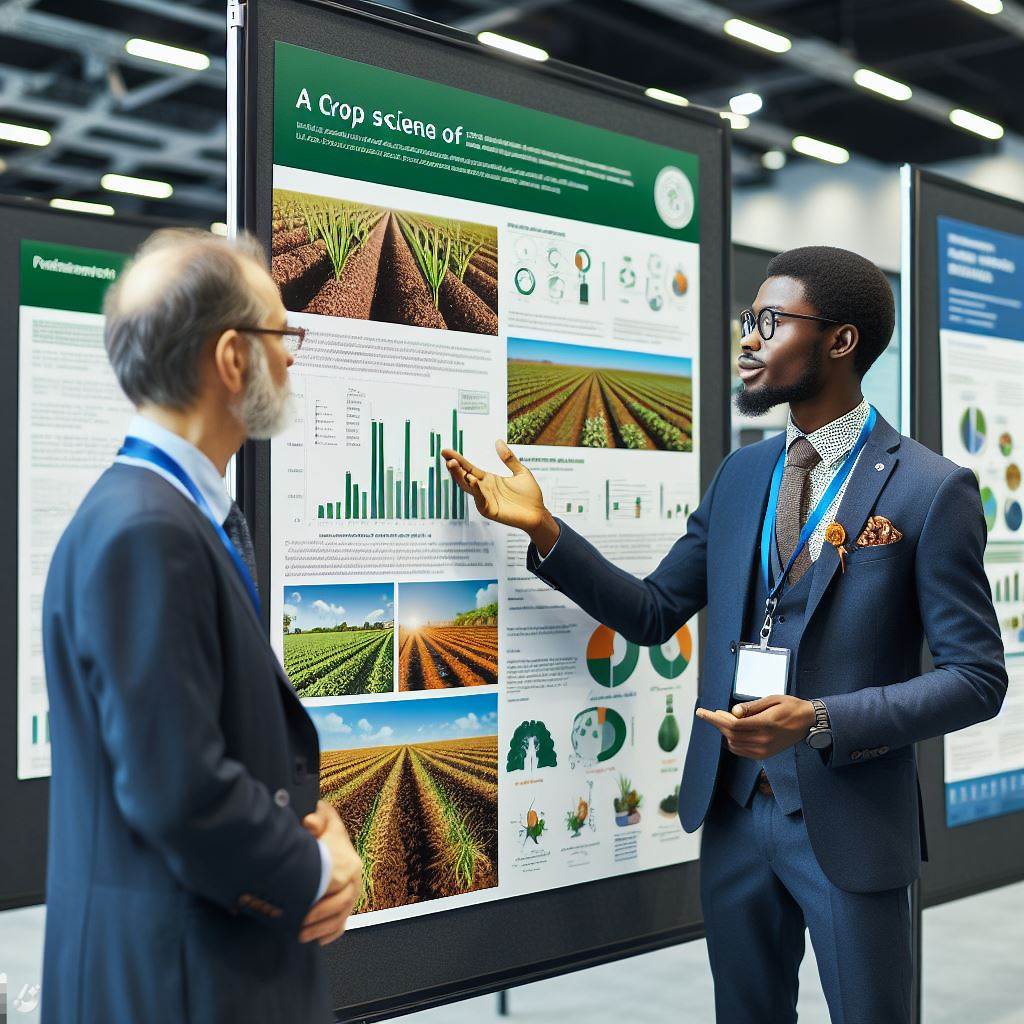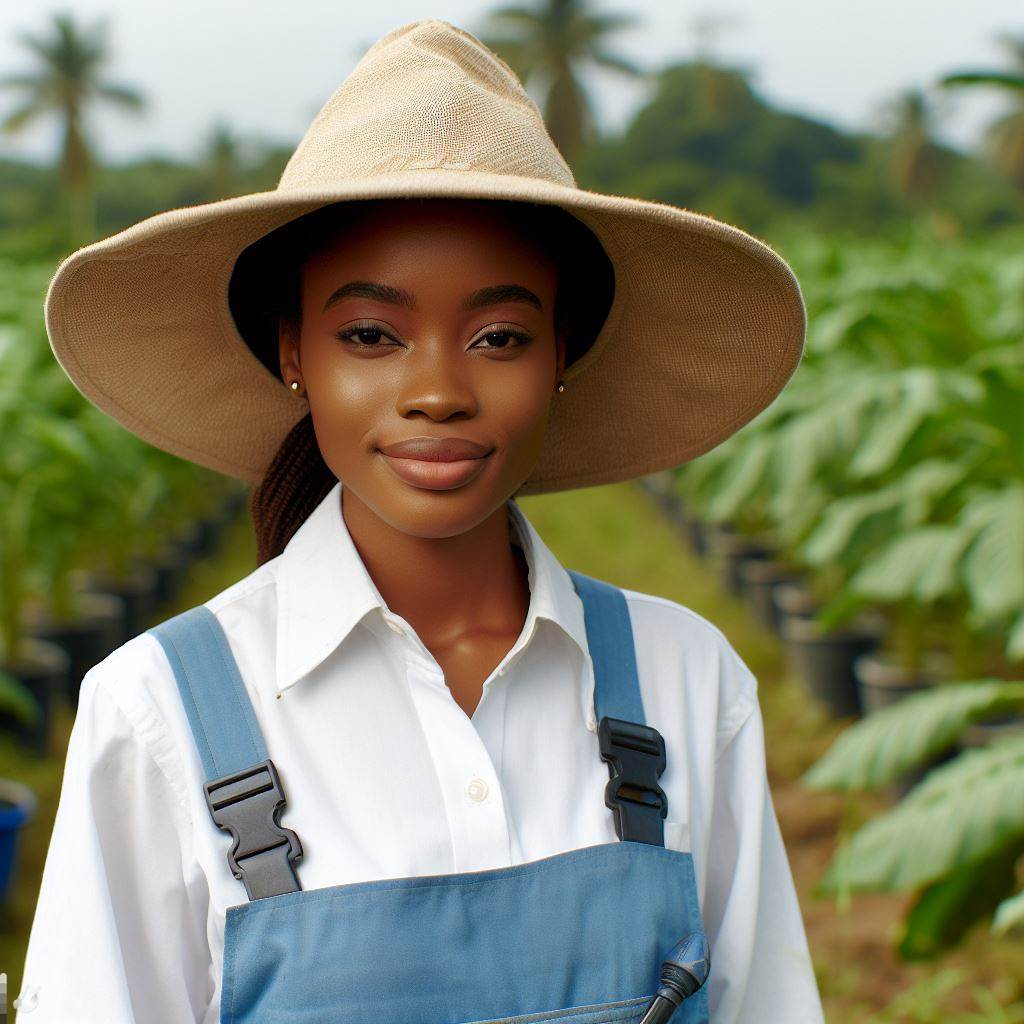Introduction
Collaborative efforts in crop science transcend borders, pooling expertise and resources for groundbreaking advancements.
Expanding these partnerships amplifies the impact, ensuring a wider reach of innovative agricultural practices.
In Nigeria, where agriculture remains pivotal, the significance of international collaboration in crop science cannot be overstated.
By broadening horizons, the country gains access to diverse perspectives and cutting-edge technologies, propelling its agricultural sector towards greater resilience and productivity.
This chapter embarks on an exploration of the transformative potential lying at the intersection of global partnerships and crop science.
Beyond Nigeria’s confines, lies a world of possibilities, ripe for collaboration, knowledge sharing, and mutual growth.
Agricultural innovation knows no bounds. By venturing beyond borders, Nigerian researchers, scientists, and farmers open doors to a wealth of insights and methodologies.
These exchanges not only enhance crop yield and quality but also fortify against challenges like climate change and pests.
The urgency to diversify crop science partnerships emanates from the interconnectedness of global challenges.
Solutions birthed through collective wisdom have the potential to address food insecurity, optimize resource utilization, and foster sustainable agricultural practices worldwide.
Nigeria’s rich agricultural heritage forms a cornerstone, but its evolution demands a global perspective.
Embracing this broader outlook elevates not only local practices but contributes significantly to the global agricultural landscape.
In the sections ahead, we’ll delve deeper into the intricate tapestry of global partnerships in crop science, exploring success stories, challenges faced, and the immense potential for growth.
Together, let’s journey into a world where collaboration cultivates a brighter future for agriculture, transcending boundaries and benefiting all.
Overview of Nigeria’s Crop Science
Brief Background on the State of Crop Science in Nigeria
Nigeria, located in West Africa, is a country with an agricultural economy.
Crop science plays a vital role in Nigeria’s agricultural sector, focusing on crop cultivation and improvement.
The state of crop science in Nigeria has seen both challenges and significant progress over the years.
Due to factors like limited funding and inadequate infrastructure, the sector faced various setbacks.
In the past, crop science in Nigeria mainly relied on traditional farming practices and lacked modern techniques.
However, recent developments have brought about positive changes in the agricultural landscape.
Advancements Made in Crop Science Research and Technology within Nigeria
Nigerian scientists and researchers are actively engaged in crop science research and development.
The government has recognized the importance of crop science and invested in its advancement.
Collaborations with international organizations and institutions have facilitated knowledge exchange and technology transfer.
Crop scientists in Nigeria have made significant strides in improving crop yields and quality.
Through extensive research, new crop varieties have been developed, adapted to Nigeria’s specific climate and soil conditions.
The use of advanced biotechnology tools and techniques has revolutionized crop science in the country.
Genetically modified crops, such as pest-resistant strains, have shown promising results in increasing agricultural productivity.
The introduction of precision agriculture technologies has allowed for accurate farming practices, minimizing waste and maximizing output.
Crop protection methods have also advanced, with the development of environmentally friendly pest management strategies.
Integrated approaches combining traditional knowledge with modern scientific methods have been embraced.
The dissemination of crop science knowledge has been prioritized through farmer training programs and educational initiatives.
Role of these advancements in crop science research and technology in transforming Nigeria’s agricultural sector
These advancements in crop science research and technology have played a crucial role in transforming Nigeria’s agricultural sector.
Farmers are now equipped with tools, knowledge, and improved crop varieties to enhance productivity and meet growing food demands.
The increased adoption of sustainable agricultural practices is helping to mitigate environmental degradation.
Additionally, crop science efforts have contributed to income generation and poverty reduction in rural communities.
The successes achieved within Nigeria’s crop science sector have gained global recognition and interest.
International partnerships and collaborations have opened doors for further growth and knowledge sharing.
Through global partnerships, Nigerian crop scientists have gained exposure to innovative research and cutting-edge technologies.
These collaborations have also facilitated market access for Nigerian agricultural products, promoting economic development.
The future of crop science in Nigeria holds immense potential, with continued investments and collaborations ensuring sustainable agricultural development.
Transform Your Career with Expert Guidance
Get personalized mentorship consulting that’s tailored to your unique path. Our expert advice is actionable and exclusive.
Get StartedIn fact, Nigeria’s crop science has gone through significant advancements, despite initial challenges.
Through research, technology, and collaborations, crop yields and quality have improved, benefiting farmers and the economy.
With continued focus and global partnerships, Nigeria can further strengthen its crop science sector and ensure sustainable agricultural growth.
Read: Wildlife Management: Balancing Conservation & Economic Growth
The Need for Global Partnerships in Crop Science
Limitations and challenges faced by Nigeria’s crop science sector
- Nigeria’s crop science sector faces limited funding for research and development.
- Insufficient infrastructure hampers the effective implementation of crop science initiatives.
- Lack of trained personnel with expertise in modern crop science techniques.
- Climate change poses challenges in adapting crops to changing environmental conditions.
- Limited access to advanced technologies and equipment hinders innovation in the sector.
- Pest and disease outbreaks threaten crop yields and food security in Nigeria.
- Inadequate collaboration between research institutions, farmers, and regulatory bodies.
Benefits of collaborating with international institutions and organizations
- Access to diverse expertise, knowledge, and technologies from global crop science leaders.
- International collaborations foster innovation and inspire new research directions.
- Joint research projects enhance scientific and technical capabilities in Nigeria’s crop science sector.
- Sharing of resources and infrastructure reduces costs and maximizes efficiency.
- Exposure to global best practices enables improvement in crop productivity and quality.
- Increased networking opportunities and access to funding from international sources.
- Improved marketability of Nigerian crops through global partnerships and certifications.
How global partnerships can help overcome resource constraints and accelerate advancements
- International collaborations provide access to additional funding for research and development activities.
- Shared resources and facilities enable cost-effective experimentation and data collection.
- Collaborative projects help leverage complementary strengths and overcome individual weaknesses.
- Exchange programs and training opportunities enhance the skills and knowledge of Nigerian researchers.
- Collaboration with international organizations can facilitate policy advocacy and regulatory support.
- Joint initiatives can address resource constraints by pooling expertise, infrastructure, and technologies.
- Global partnerships accelerate the development and adoption of innovative crop science solutions.
In short, Nigeria’s crop science sector faces various limitations and challenges that hinder its progress.
However, global partnerships offer a compelling solution to overcome these obstacles.
Collaborating with international institutions and organizations brings numerous benefits, including access to expertise, resources, and funding.
By leveraging global partnerships, Nigeria can overcome resource constraints and accelerate advancements in crop science, ultimately enhancing food security, increasing crop productivity, and ensuring sustainable agricultural practices in the country.
Read: The Future of Crop Science Education in Nigeria: Predictions and Trends

Examples of Successful Global Partnerships in Crop Science
Case studies of existing collaborations between Nigerian institutions and international partners
In one case study, the University of Ibadan partnered with the University of California for sustainable farming practices.
Another collaboration involved the National Root Crops Research Institute in Nigeria working with the International Potato Center to enhance crop productivity.
The Nigerian Institute of Oceanography and Marine Research collaborated with the University of British Columbia to improve aquaculture techniques.
Positive outcomes and impact of these partnerships on crop science in Nigeria
The collaboration between Nigerian and international institutions has led to improved crop yields and enhanced agricultural practices.
Through these partnerships, Nigeria has gained access to advanced technologies and research methodologies.
The exchange of knowledge and expertise has resulted in the development of new crop varieties suitable for Nigerian climatic conditions.
Importance of knowledge-sharing and technology transfer in these collaborations
Knowledge-sharing between Nigerian and international institutions has facilitated the transfer of innovative practices and techniques.
Technology transfer has played a crucial role in improving crop science by introducing advanced farming equipment and precision agriculture methods.
These collaborations have allowed Nigerian researchers to gain exposure to cutting-edge research and advancements in the field of crop science.
Successful global partnerships in crop science between Nigerian institutions and international partners have yielded positive outcomes and advancements in agricultural practices.
Through knowledge-sharing and technology transfer, these collaborations have paved the way for sustainable farming practices, improved crop yields, and the development of crop varieties suitable for local conditions.
It is crucial for Nigeria to continue fostering such partnerships to further enhance the agricultural sector and ensure food security in the country.
Read: Wildlife Sanctuaries: Nigeria’s Underrated Gems
Strategies for Building Global Partnerships in Crop Science
Key Stakeholders and Potential Partners in the Global Crop Science Community
Building global partnerships in crop science requires a thorough understanding of key stakeholders and potential partners.
By identifying these individuals and organizations, it becomes easier to establish fruitful collaborations.
Crop science conferences offer a platform to connect with stakeholders and potential partners who share a common interest.
Attending these events provides an opportunity to interact with experts in the field and explore potential partnership opportunities.
Approaches for Initiating and Fostering Partnerships, such as Conferences, Joint Research Projects, and Exchange Programs
Conferences serve as a valuable platform for initiating and fostering partnerships in crop science.
These events create an environment conducive to networking and collaboration.
Another approach is through joint research projects.
By collaborating on research initiatives, partners can combine expertise and resources to address complex challenges in crop science.
Exchange programs offer a unique opportunity to build global partnerships.
Through these programs, researchers can experience different perspectives and gain a deeper understanding of various agricultural systems.
Significance of Mutual Benefit and Shared Goals in Sustaining Partnerships
To sustain partnerships in crop science, mutual benefit and shared goals play a crucial role.
It is essential for partners to identify and define common objectives.
Partnerships based on mutual benefit create a win-win situation where both parties contribute and gain valuable insights.
This fosters trust and strengthens the partnership over time.
Shared goals ensure alignment and a unified direction.
When partners have a collective vision, they are more likely to overcome challenges and work towards achieving common outcomes.
In general, building global partnerships in crop science requires the identification of key stakeholders and potential partners.
Approaches such as conferences, joint research projects, and exchange programs aid in initiating and fostering these partnerships.
The significance of mutual benefit and shared goals cannot be overstated in sustaining collaborations.
By employing these strategies, the crop science community can work together to address global agricultural challenges and drive innovation.
Read: Careers in Ecotourism & Wildlife Management in Nigeria
Future Prospects and Opportunities for Crop Science Beyond Nigeria’s Borders
Potential areas for expansion and growth in crop science research globally
In order for crop science to thrive beyond Nigeria’s borders, it is essential to identify potential areas for expansion and growth.
One such area is Latin America, where countries like Brazil and Argentina have rich agricultural resources and a strong research infrastructure.
The Asia-Pacific region is also a promising field for crop science.
With countries like China and India experiencing rapid economic growth, there is a growing demand for innovative agricultural technologies and solutions.
Africa itself presents immense opportunities for crop science research.
Countries like Kenya, Ethiopia, and Uganda have a significant agricultural sector and can benefit from partnerships and knowledge exchange.
Emerging trends and technologies in the field that can be leveraged through partnerships
Partnerships play a crucial role in leveraging emerging trends and technologies in crop science.
One promising trend is precision agriculture, which involves the use of sensors, drones, and data analytics to optimize farming practices.
Genomic technologies are also transforming crop science research.
Through partnerships, scientists can collaborate on groundbreaking genome editing techniques, such as CRISPR-Cas9, to develop crops with enhanced traits, such as resistance to diseases and pests.
Additionally, digital platforms and artificial intelligence prove to be valuable tools in crop science.
Through partnerships, experts can harness the power of data analytics and machine learning to predict crop outcomes, optimize resource allocation, and enhance sustainability.
Role of crop science in addressing global challenges like food security and climate change
Crop science plays a crucial role in addressing global challenges such as food security and climate change.
With a growing global population, it is essential to develop new crop varieties that can produce higher yields, withstand environmental stresses, and improve nutritional value.
Through research and partnerships, crop scientists can work towards developing climate-smart agriculture practices.
These practices aim to reduce greenhouse gas emissions, increase carbon sequestration, and enhance the resilience of crops to changing climatic conditions.
Crop science can also contribute to sustainable intensification, where agricultural productivity is increased while minimizing negative environmental impacts.
By developing innovative farming techniques, such as agroforestry and integrated pest management, crop scientists can address global challenges while preserving natural resources.
In a nutshell, the future prospects and opportunities for crop science beyond Nigeria’s borders are vast.
By exploring potential areas for expansion, leveraging emerging trends and technologies, and addressing global challenges, crop science can contribute to a sustainable and food-secure future.
Conclusion
Building Global Partnerships in Crop Science
Global partnerships in crop science hold immense significance.
Collaborations transcend borders, pooling diverse expertise, and resources to revolutionize agricultural practices.
Encouraging Nigerian Stakeholders for International Collaboration
Stakeholders in Nigeria should actively seek partnerships beyond national boundaries.
Embracing global alliances fosters innovation, sharing knowledge, and leveraging varied perspectives.
Long-term Benefits of Cross-Border Partnerships
The potential benefits of such collaborations are monumental.
Enhanced research capacities, technological advancements, and sustainable agricultural practices will emerge, elevating crop yields and ensuring food security.
In today’s interconnected world, crop science transcends geographical limitations.
By forging global alliances, Nigeria can access advanced technologies and novel methodologies, propelling agricultural development.
The synergy between Nigerian experts and global counterparts amplifies research capabilities.
This synergy cultivates a fertile ground for innovation, tackling challenges like climate change and crop diseases.
Beyond immediate gains, sustained partnerships promise enduring advantages.
Knowledge exchange, skill enrichment, and technology transfer empower local farmers, fostering self-sufficiency and economic growth.
Moreover, these alliances foster cultural understanding and mutual respect.
Bridging diverse perspectives nurtures a collaborative environment, spurring breakthroughs in crop science and sustainable farming practices.
The ripple effects of international partnerships extend far and wide.
Improved agricultural productivity not only meets immediate food demands but also bolsters resilience against future challenges, securing a prosperous future.
The trajectory of Nigeria’s agricultural sector hinges on proactive global engagements.
Embrace collaborative ventures, explore shared expertise, and sow the seeds of a flourishing crop science landscape.
Together, let’s cultivate a sustainable future for generations to come.




